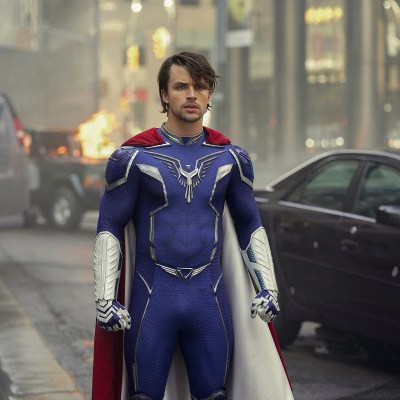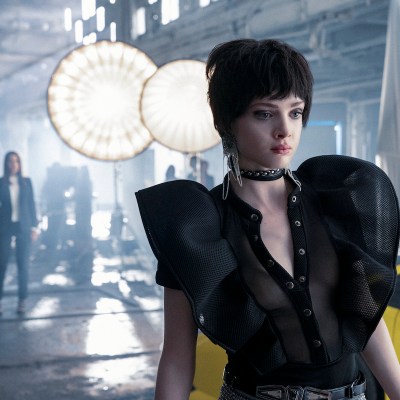Jupiter’s Legacy: Mark Millar on the Genesis of His Superhero Story
This article is presented by: 
Superheroes have a long history. After flying onto the scene more than eight decades ago, led by Superman, along with fellow octogenarians Batman, Wonder Woman, and Captain America, the pantheon of capes-and-tights characters has expanded to include countless more. And as legendary creators made their mark across decades, the origins and powers of these icons transformed almost as frequently as their costumes.
Meanwhile, the superhero team The Union, from the comic book saga Jupiter’s Legacy, have 90 years of consistent fictional history, with a singular overarching story, envisioned by one man: Mark Millar.
After discovering both Superman and Spider-Man comics the same day, at the age of four in Scotland (where he grew up), the now 51-year-old writer would go on to make a significant impact on the superpowered set. But he wanted his own pantheon.
And with Jupiter’s Legacy, Mark Millar has created a long history of superheroes of his own—now set to be adapted as a Netflix series.
“I wanted to do an epic,” he says. “Like The Lord of the Rings, or Star Wars… the ultimate superhero story.”
Co-created with artist Frank Quitely and published by Image Comics in 2013, Millar calls Jupiter’s Legacy his love letter to superheroes—and part of his own legacy.
The story begins in 1932 with a mysterious island that grants powers to a group of friends who then adopt the costumed monikers The Utopian, Lady Liberty, Brainwave, Skyfox, The Flare, and Blue Bolt. Told on a grand scale with cross-genre influences, the story spans three arcs: the prequel Jupiter’s Circle (with art by Wilfredo Torres), Jupiter’s Legacy, and the upcoming June 16, 2021 release Jupiter’s Legacy: Requiem (featuring art by Tommy Lee Edwards). With the May 7 debut of the Jupiter’s Legacy series on Netflix, the story will now also be told in live action.
Millar established himself in the comics industry in 1993 and crafted successful stories including Superman: Red Son, Wolverine: Old Man Logan, The Ultimates, and Marvel Comics’ Civil War—all of which have inspired adaptations and films, and led to him becoming a creative consultant at Fox Studios on its Marvel projects. His creator-owned titles Kingsman: The Secret Service, Kick-Ass, and Wanted, have likewise spawned hit movies.
But compared to Jupiter’s Legacy, none of those possessed such massive scope and aspiration as the story that explores the evolving ideologies of superpowered individuals, and how involved they should be when it comes to solving the world’s problems. Relationships are forged—and shattered by betrayal—with startling violence and titanic action sequences (both part of Millar’s signature style).
“From Superman and the Justice League to Marvel to British comics—inspired by guys like Alan Moore, and so on, I’ve thrown it in there… it’s got a bit of everything,” he says.
That “everything” extends beyond comic books. Millar drew inspiration from King Kong’s Skull Island, and references the cosmic aesthetic of 2001: A Space Odyssey, which informed the “sci-fi stuff.” The writings of horror author H.P. Lovecraft “were a big thing for me,” when it came to The Island, created by aliens, “that existed before humanity, and that these people are drawn out towards where they get their superpowers.” The character Sheldon Sampson/The Utopian is a Clark Kent/Superman type, but his cohort George Hutchence/Skyfox is more than a millionaire playboy stand-in for Bruce Wayne. Rather, Millar based him on British actors from the 1960s—Peter O’Toole, Oliver Reed, Richard Burton, Richard Harris—who were suave rascals.
“I loved the idea of a superhero having a good time, getting on with girls, drinking whisky, smoking lots of cigarettes,” Millar said.
At the risk of sounding “so pretentious,” Millar jokes, he also pulled from Shakespeare. Indeed, the comics are as much a family saga as a superhero one (and written by the much younger brother of six whose parents died before he was 20). Utopian is a father to his own disappointing children, and a father of sorts to all heroes. He is Lear as much as he is Jupiter, the Roman god of gods. The end of his reign approaches, and various factions have their own appetite for power—such as his self-righteous brother who thinks he should be a leader, or Utopian’s son, born into the family business of being a hero, but who could never live up to his father’s expectations, or his daughter who is more interested in fame than heroism.
He views Jupiter’s Legacy as more thoughtful than Kick-Ass, Kingsman, or Wanted. The plot’s driving action hinges on a debate about the superheroes’ philosophies and moral imperatives. It seeks to address a question Millar asked when he was a kid reading comics.
“Why doesn’t Superman solve the world’s problems?” he recalls thinking. “Why didn’t he interfere and stop wars from even existing?… Is it ethically wrong to stand aside and just maintain the status quo, especially when the status quo creates so many problems for a lot of people?”
On one side of the debate, Utopian believes interfering too much with society’s trajectory is a bad move. It’s not that he is cynical; quite the opposite. He thinks things are actually improving in the world. His viewpoint is there are less people hungry across the globe than ever before, and less people with disease. Millar describes Utopian as a “Truth, Justice, and the American Way” kind of hero, to borrow a phrase associated with Superman, and believes capitalism works. As his hero name suggests, Utopian thinks a better world is within reach, even if it takes generations, and encourages even the heroes to be patient and trust people to do the right thing because they are innately good.
“He says, if you look at the difference somebody like Bill Gates has made in Africa—just one guy—if you look at capitalism taken to the Nth degree, then it pulls everybody up, and poverty in places like India, is massively better just compared to a generation ago.”
Besides, as Utopian says to his impatient brother Walter/Brainwave, in Jupiter’s Legacy #1, being a caped hero doesn’t make them economists and, “Just because you can fly doesn’t mean you know how to balance a budget.” Plus, the notion of using psychic powers or brute force to simply make the world “better” is out of the question. Or is it?
The mainstream awareness of superheroes baked in from more than 80 years of stories, and the shorthand that especially comes with 13 years of the Marvel Cinematic Universe commercial juggernaut, has provided Millar with a set of archetypes to lean into. It was true of the hero proxies in the Jupiter’s Legacy books, and he says it’s true of the show. In fact, he says audiences are so sophisticated with regards to these types of characters they’ll be able to immediately slip into his universe, and that “a lot of the hard work has been done for us.” He adds that audience literacy with superhero tropes also provided him something to push against.
“The Marvel characters lock these guys up in prison at the end of these movies,” Millar says. “Everything’s tied up neatly with a bow, the rich are still the rich, the poor are still starving, and the superheroes aren’t really doing anything for the common man in any very global sense. These guys have just had enough of that.”
Millar’s comics technically kick off in 1932, when Sheldon first brings his friends on a journey to The Island, but his story goes back to 1929 when the stock market crashed, and the Great Depression began. This is likewise when the Netflix series will begin, and Millar says it’s because of the historic parallels between then and 2021.
Read more
“We’ve been in a similar situation as we are now: there’s impending financial collapse coming out of a global pandemic,” he says. “The idea is that history continues and repeats itself, and people make the same mistakes over and over again, and the superheroes are saying, ‘Let’s actually fix everything.’”
Continuing the theme of parallels, when discussing the inception of Jupiter’s Legacy with Millar, The Godfather Part II comes up more than once because of the film’s dual storylines following Vito Corleone and son Michael, separated by decades. However, while the comics contain some flashbacks, the plot doesn’t unfold across different time periods simultaneously. But the Netflix series will shift between eras, with half of the show during the season taking place in 1929, for which Millar credits Steven S. DeKnight, who developed the series.
“The way Steven structured it was really brilliant, because I saw these taking place over two [different] years,” Millar says. “[But] The Godfather Part II track shows you the father and the son at the same age and juxtaposes their two lives.”
As a result, he says the series is a visual mash-up of genres that’s both classical and futuristic.
“It just feels like a beautiful period movie, then when it gets cosmic, and it gets to the superhero stuff, it’s a double wow… it’s like seeing Once Upon a Time in America suddenly directed by Stanley Kubrick doing 2001.”
This is a notable advantage to bringing the story to television, as opposed to making Jupiter’s Legacy three two-hour films as he originally planned with producer Lorenzo di Bonaventura in 2015. Millar says that to tell the Jupiter’s Legacy story properly on screen would require 40 hours, and with a series, what would have been a one-minute flashback in a movie can now be revealed in two hours of its own.
It was another director who has since made a name adapting ambitious comic book properties that extolled to Millar the benefits of television: James Gunn. When Gunn (Guardians of the Galaxy, The Suicide Squad) had a chat with Millar about the project, Gunn said it could never be done as a movie. “The smartest guy in the world is James Gunn,” Millar says.
An exciting challenge of adapting his work for television is that the series will expand on the backstories and concepts of the books. For example when Sheldon Sampson and his friends head to The Island in the first issue, it takes up six pages. Within the series, half of the first season is that journey, and what happens when they arrive.
“Six issues of a graphic novel are roughly about an hour and 10 minutes of a movie; for something like an eight-part drama on TV, you really have to flesh it out,” he says. “It just goes a little deeper than what I had maybe two panels do.”
He emphasizes, however, that these flourishes won’t contradict the comics. Though he sold Millarworld to Netflix, he remains president so he can maintain control of his creations.
Overall the series has made the writer realize the value of television, and while a second season has not yet been confirmed, he’s already thinking about a third and fourth, and how it will dovetail with the upcoming Requiem. The story that began in 1929 continued through 2021, and collected in four volumes, will soon continue far into the future in the concluding two volumes.
“We saw the parents, then we have the present, and then we see their children in the next storyline,” he says. “That storyline goes way off into the future where we discover everything about humanity, superheroes, all these things. It’s a big, grand, high-concept, sci-fi thing beyond that.”
Listening to the jovial Millar discuss the scope of his Jupiter universe, which is imbued with optimism, one might not think this is the same person known for employing graphic violence in his works.
He thinks his films especially are violent yet hopeful, and fun. Kingsman is a rags-to-riches story, and “you feel great at the end of Kick-Ass, even though you’ve seen 200 people knifed in the face.” But he doesn’t consider his writing to fit under the dark-and-gritty label, and he’s not interested in angst, which he finds dull. With Jupiter’s Legacy, the comic and the show, he views the tone as complex but not “overtly dark.”
Additionally, Millar says he thinks society needs hopeful characters such as Captain America, Superman, and yes, The Utopian in 2021—as opposed to an ongoing genre trend of heroes drowning in pathos.
“The Superman-type characters are just now something from a pop culture, societal point of view, we need more than ever,” he says. “The last thing you want is seeing the world as dark, as something that makes you feel bad. Never forget Superman was created just before World War II in the midst of the economic depression by two Jewish kids who were just scraping a living together… I just think it’s so important when things are tough to have a character like that that makes you feel good.”
Even though Utopian suffers for his idealism in the comic, Millar says his ideas are passed on. This is The Utopian’s legacy.
“Ultimately, he wins if you think about it,” ponders Millar.
After a successful career spent creating characters and re-shaping superheroes with 80 years of history, the new pantheon of Jupiter’s Legacy may become one of the defining and lasting features of Mark Millar’s own legacy.
Jupiter’s Legacy premieres on Netflix on May 7. Read more about the series in our special edition magazine!
The post Jupiter’s Legacy: Mark Millar on the Genesis of His Superhero Story appeared first on Den of Geek.
From https://www.denofgeek.com/tv/jupiters-legacy-mark-millar-interview/





